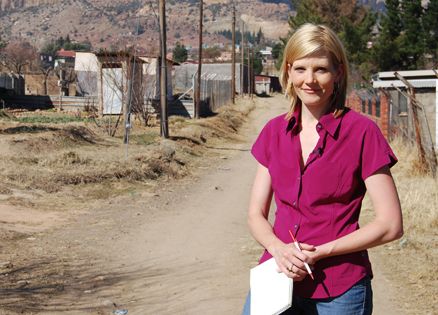My BlackBerry buzzed on my desk and I gave it a quick glance. Very quick.
My BlackBerry buzzes all the time and I’ve gotten pretty good at sorting the important stuff (my husband’s updates from home about our two kids) from the headlines I’m bombarded with as a TV news correspondent. This headline, though, caught my attention: World’s Oldest Pupil Dies at Age 89.
“Oh, no!” I cried. Though the man referred to in the headline had lived thousands of miles away in Africa, and I’d only met him once in my life, I felt a profound sense of loss. Kimani Nganga Maruge was indeed the world’s oldest student, a Kikuyu tribesman from a Kenyan shantytown who, at age 84, decided to get the elementary school education he’d been denied as a child—so he could learn to read the one book he had yearned to understand all his life, the Bible.
I’d done a story on Kimani three years earlier. I’d never forgotten him. In all my years as a reporter, among all the world-changing events I’ve covered and the famous people I’ve interviewed, Kimani Maruge stood out. He was one of the most inspiring men I’ve ever met.
I was lucky to meet him at all. In 2006 a production crew and I traveled to Africa to film an in-depth segment about the Masai Mara, a massive game reserve on the Serengeti Plain in southern Kenya. Only because we were already in Africa on assignment were we able to detour to the Kenyan city of Eldoret, where Kimani lived. Though he was a fascinating subject who’d already attracted lots of international media coverage, network news budgets aren’t what they used to be and I probably couldn’t have justified flying all the way to Africa just to meet him.
When I say that Kimani lived in a shantytown, I mean it. His house was a small one-room mud hut with a door fashioned from wood boards. Inside was a bed, a stool doubling as a nightstand, some clothes and not much else. Kids ran laughing through streets of red dirt. Animals grazed in nearby fields.
Kimani was seated outside his door cooking a sweet potato in a battered tin pot over a pile of smoldering corn cobs. It was Sunday afternoon. One of Kimani’s children, a son named James, was reading to him from the Bible. Kimani smiled. His teeth were crooked, but his face, creased by wrinkles, was radiant. He projected a kind of impatient joy, the happiness of a determined, practical person who has, quite unexpectedly, stumbled upon something wonderful.
That something wonderful was a recently passed law granting all Kenyans free access to primary education. Previously, Kenyans had to pay fees to attend public school—unfortunately all too common in Africa. According to UNESCO, the United Nations education organization, fewer than half of primary-school-age children in many African nations attend class.
Access is even lower in rural areas and urban slums. Schools lack teachers, teachers are untrained and classrooms often do not have a single textbook. Families either can’t afford to send their kids to school or find it’s financially necessary to put the children to work.
That was what had happened to Kimani. He was the oldest of seven children, he told us, and he’d grown up helping his father in the fields so his younger siblings could attend school. He remained a farm laborer, leaving the fields only to join Kenya’s struggle for independence from British rule. He showed us his left foot, missing a toe. “I lost it in the war,” he said.
Throughout his hard life Kimani had remained a steadfast Christian. (More than half of all Kenyans are Christians, a legacy of British missionaries.) Still, he longed to know the Bible better. Because he couldn’t read, he had to rely on sermons and his children for knowledge of Scripture.
All of that changed in 2003, when Kenya abolished fees for primary school. Though schools remained underfunded, enrollment rates grew nearly 60 percent in following years. Kimani saw children, including three of his grandchildren, streaming to Kapkenduiywa Primary School in his shantytown. He saw them learning to read. He was in his eighties, but he thought, Why not me?
“All my life I have wanted to read the Bible,” he told us. Now was his chance.
One day he walked to Kapkenduiywa and asked to attend. Jane Obinchu, the headmistress, took one look at him and shooed him away. “We thought he was lost,” she said. “It was the last thing on our minds that he wanted to come to school.” Over the next few months Obinchu turned Kimani away four more times. He always came back.
Finally, in late 2004, Obinchu realized this elderly man was serious. He arrived at school wearing the proper uniform—shorts (which he’d made by cutting the legs off one of his few pairs of trousers), a collared shirt and a matching coat. He told Obinchu he was ready to learn. “All right,” she said. “You may come to school.”
Kapkenduiywa is a far cry from a well-appointed American school. The buildings are more like brick-walled shelters. Students play in a red-dirt courtyard. The school is overcrowded, like many in Kenya. Average class size is 100 students. Despite such challenges, Kimani thrived. The other students made fun of him at first, but he persevered and eventually was named head of his class. He passed exams in English, math, reading and Swahili.
Word got out and Kenyan journalists began writing stories. The British Broadcasting Corporation aired a profile of Kimani, and suddenly reporters from around the world descended on Eldoret.
By the time we met Kimani, he was in third grade, perhaps the most famous elementary school student in all of Africa. His English was by no means perfect, but he knew enough to tell us the basics about himself. What I remember most was his shining spirit. Here was a man who’d endured incredible hardship and yet the joy never left his face. He was thrilled to have something most Americans take for granted—a free education. He wasn’t reading the Bible cover to cover (he was only in third grade, after all), but he was full of thanks to be progressing toward his goal.
“There are those who don’t like to work,” he said. “But look at me! I do the hard work.”
Just two years after I met Kimani, rioting broke out in Kenya following a disputed election. Kimani’s shantytown was devastated and he was forced to relocate to a refugee camp. He stayed in school, walking with a cane two and a half miles each way to attend class. Only when he became ill with cancer the following year did he drop out. News reports of his death said that words from Scripture were among the last sounds Kimani heard.
I turned from my BlackBerry to my computer to blog about Kimani for ABC News. “Kimani Nganga Maruge was one of the most charming, most determined men I’ve ever met,” I wrote. That only began to capture his impact on me. Meeting Kimani changed my perspective on life.
These days, whenever I find myself complaining about the stresses of work or parenting, I think of Kimani and suddenly I feel tremendously grateful for what I have and pretty sheepish about my grousing. I think of him sitting in his hut, poring determinedly and delightedly over his Bible, always seeking to know more. He was the world’s oldest student. And one of my most inspiring teachers.






